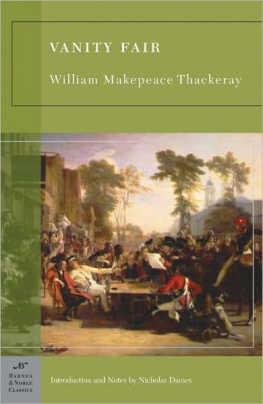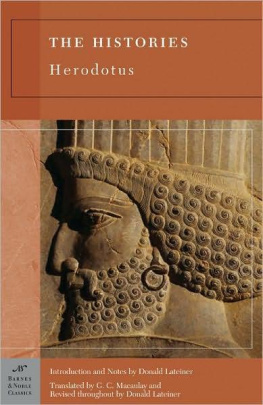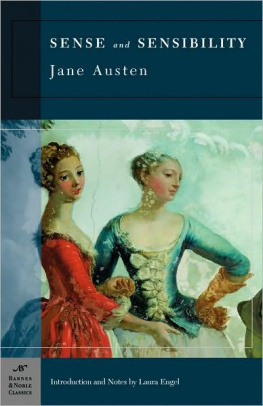WILLIAM MAKEPEACE THACKERAY
William Makepeace Thackeray was born on July 18, 1811, in Calcutta, India. His father, an officer for the East India Company, died when William was a young boy, and he was sent to England to live with his aunt and attend school. Never much of a student, William left Trinity College, Cambridge, after two years and traveled to Germany. When he returned to England, he began to study law at Londons Middle Temple, but in 1832, when he received an inheritance from his father, he dropped out to pursue the life of a writer and artist; beginning in 1834, he lived in Paris for three years.
Back in London, he began to contribute regularly to various periodicals, including the Times, Frasers, the Morning Chronicle, the New Monthly Magazine, and Punch. At first he published anonymously or under a pseudonym; Michael Angelo Titmarsh, George Savage FitzBoodle, Jeames de la Pluche, and Ikey Solomons were among the pen names he used. The Paris Sketch Book (1840) was his first book-length publication and The Irish Sketch Book (1843) the first volume to be published under his own name.
The successful serial publication of Vanity Fair (1847-1848) in Punch placed Thackeray at the forefront of the British literary scene. The response to the first chapters was lukewarm, but this satire of upper-middle-class life in early-nineteenth-century England quickly became a critical and popular success. The books heroine, Becky Sharp, remains one of the most memorable heroines in British fiction.
Like Vanity Fair, most of Thackerays work first appeared in numbers, or installments, including The Snobs of England, by One of Themselves (18461847), the semi-autobiographical Pendennis (1848-1850), its sequel The Newcomes (1853-1855), and The Virginians (1857-1859). One exception, The History of Henry Esmond (1852), a historical novel, was initially published in three volumes. Thackerays work and that of his contemporary Charles Dickens have often been compared.
William Makepeace Thackeray portrayed the society and personages of eighteenth- and nineteenth-century England with sardonic wit and eloquence. He died of a cerebral hemorrhage on Christmas Eve 1863, leaving unfinished the historical romance Denis Duval.
AN INSPIRATION FOR VANITY FAIR
For the title of his foremost satire of society and manners, William Makepeace Thackeray borrowed from another writer, John Bunyan. In Bunyans allegory The Pilgrims Progress (Part I published in 1678; Part II in 1684), Vanity Fair was an ancient carnival on the outskirts of a town called Vanity. Permanently situated in the path that leads toward Heaven, Vanity Fair tries to lure men away from their proper spiritual goal and has done so since the beginning of time.
The Vanity Fair episode in Bunyans bookits full title is The Pilgrims Progress from This World, to That Which Is to Come: Delivered Under the Similitude of a Dream Wherein Is Discovered, the Manner of His Setting Out, His Dangerous Journey; and Safe Arrival at the Desired Countrey
was meant to reflect the superficiality of Restoration society. Until well into the nineteenth century, The Pilgrims Progress was second only to the Bible in popularity; in citing his influences, Robert Louis Stevenson wrote, I must name the Pilgrims Progress, a book that breathes of every beautiful and valuable emotion.
The following excerpt from The Pilgrims Progress describes the Vanity Fair:
Then I saw in my dream, that when they were got out of the wilderness, they presently saw a town before them, and the name of that town is Vanity; and at the town there is a fair kept, called Vanity Fair: it is kept all the year long. It beareth the name of Vanity Fair because the town where it is kept is lighter than vanity; and, also because all that is there sold, or that cometh thither, is vanity. As is the saying of the wise, All that cometh is vanity.
This fair is no new-erected business, but a thing of ancient standing; I will show you the original of it.
Almost five thousand years agone, there were pilgrims walking to the Celestial City, as these two honest persons are: and Beelzebub, Apollyon, and Legion, with their companions, perceiving by the path that the pilgrims made, that their way to the city lay through this town of Vanity, they contrived here to set up a fair; a fair wherein, should be sold all sorts of vanity, and that it should last all the year long: therefore at this fair are all such merchandise sold, as houses, lands, trades, places, honours, preferments, titles, countries, kingdoms, lusts, pleasures, and delights of all sorts, as whores, bawds, wives, husbands, children, masters, servants, lives, blood, bodies, souls, silver, gold, pearls, precious stones, and what not.
And, moreover, at this fair there is at all times to be seen jug glings, cheats, games, plays, fools, apes, knaves, and rogues, and that of every kind.
Here are to be seen, too, and that for nothing, thefts, murders, adulteries, false swearers, and that of a blood-red colour.
And as in other fairs of less moment, there are the several rows and streets, under their proper names, where such and such wares are vended; so here likewise you have the proper places, rows, streets, (viz. countries and kingdoms), where the wares of this fair are soon est to be found. Here is the Britain Row, the French Row, the Italian Row, the Spanish Row, the German Row, where several sorts of vanities are to be sold. But, as in other fairs, some one commodity is as the chief of all the fair, so the ware of Rome and her merchandise is greatly promoted in this fair; only our English nation, with some others, have taken a dislike thereat.
Now, as I said, the way to the Celestial City lies just through this town where this lusty fair is kept; and he that will go to the city, and yet not go through this town, must needs go out of the world. The Prince of princes himself, when here, went through this town to his own country, and that upon a fair day too; yea, and as I think, it was Beelzebub, the chief lord of this fair, that invited him to buy of his vanities; yea, would have made him lord of the fair, would he but have done him reverence as he went through the town. Yea, because he was such a person of honour, Beelzebub had him from street to street, and showed him all the kingdoms of the world in a little time, that he might, if possible, allure the Blessed One to cheapen and buy some of his vanities; but he had no mind to the merchandise, and therefore left the town, without laying out so much as one farthing upon these vanities. This fair, therefore, is an ancient thing, of long standing, and a very great fair.
COMMENTS & QUESTIONS
In this section, we aim to provide the reader with an array of perspectives on the text, as well as questions that challenge those perspectives. The commentary has been culled from sources as diverse as reviews contemporaneous with the work, letters written by the author, literary criticism of later generations, and appreciations written throughout the works history. Following the commentary, a series of questions seeks to filter William Makepeace Thackerays Vanity Fair through a variety of voices and bring about a richer understanding of this enduring work.
Comments
CHARLOTTE BRONT
You mention Thackeray, and the last number of Vanity Fair. The more I read of Thackerays worksthe more certain I am that he stands alone; alone in his sagacity, alone in his truth, alone in his feeling (his feeling, though he makes no noise about it, is about the most genuine that ever lived in a printed page) alone in his power, alone in his simplicity, alone in his self-control. Thackeray is a Titan.







